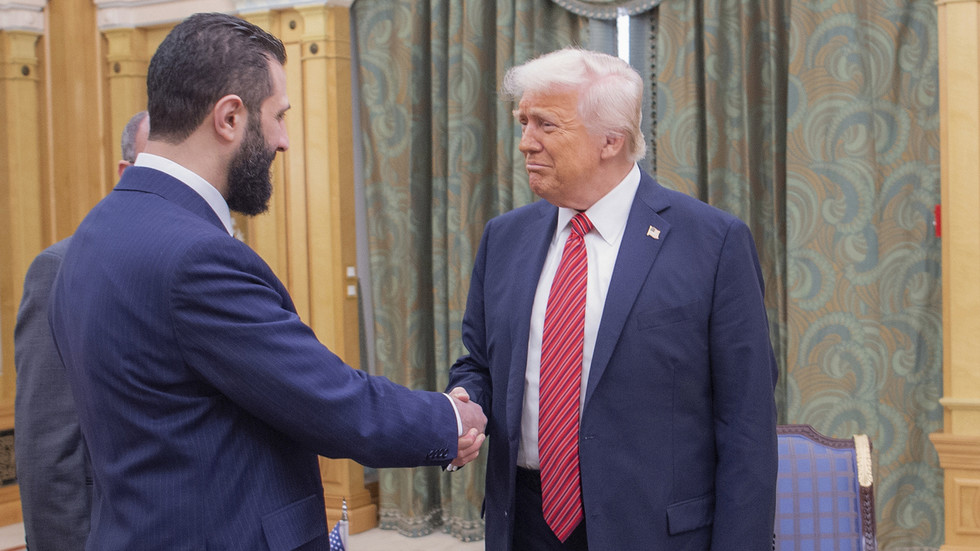He Calls Them Handsome, Attractive, Tough: Trump's Bromance With Arab Leaders

WSJ
May 16, 2025 07:25 AM IST
ABU DHABI, United Arab Emirates—Three days in the Middle East have put President Trump’s bromance diplomacy on full display.

“I like you too much,” Trump told Saudi Crown Prince Mohammed bin Salman, later placing his hand on his heart as the two men bid farewell on the airport tarmac. Syrian President Ahmed al-Sharaa was “attractive” and “tough,” Trump said after in Riyadh">a surprise meeting in Riyadh with the former rebel leader who toppled Syria’s longtime dictator in December. Trump said Qatar’s ruling emir and his family were “tall, handsome guys.”
“You’re a magnificent man,” Trump said Thursday at the royal palace here, as he sat beside Sheikh Mohamed bin Zayed Al Nahyan, president of the United Arab Emirates.
Trump’s close ties with Arab leaders stand in contrast to his interactions with some traditional U.S. allies, including European counterparts, who have been the subject of the president’s derision and criticism. And it signals that Trump is turning to strong relations with the Gulf as the centerpiece of his Middle East strategy.
The Gulf monarchs returned Trump’s affection. Sheikh Mohamed bestowed on Trump the Order of Zayed, the country’s highest civilian honor. All three countries organized fighter-jet escorts for Air Force One. They committed to trillions in U.S. business investments. They organized camel parades, horseback riders, singers, sword dancers and lavish parties in opulent palaces. And they heaped praise on Trump as a political comeback king, sometimes echoing his rhetoric with phrases like “drill, baby, drill.”
Trump’s unreserved adoration for Prince Mohammed marked a contrast with former President Joe Biden, who vowed during the 2020 presidential campaign to treat Saudi Arabia like a “pariah.” Amid high energy prices, Biden visited Saudi Arabia in 2022 and gave Prince Mohammed a fist bump, in an attempt to reset the tense relationship.
Trump this week cast his bonds with Arab leaders as central to his foreign policy. “We will work together, we will be together, we will succeed together, we will win together and we will always be friends,” Trump said in his keynote address in Riyadh.
It was the second Trump term’s greatest display of the president’s personalization of foreign policy, which is deeply influenced by his relationships with world leaders. Trump announced this week that the U.S. would lift sanctions on Syria in large part because of how he viewed Sharaa, a U.S.-designated terrorist who overthrew dictator President Bashar al-Assad last year. Trump also said Saudi Arabia’s Prince Mohammed and Turkish President Recep Tayyip Erdogan influenced his decision.
“Oh, what I do for the crown prince,” Trump said during a speech in Saudi Arabia. At the end of Trump’s remarks about the kingdom, Prince Mohammed stood and applauded, letting loose a wide smile.
Ahead of the trip, the Saudis floated adding a round of golf to Trump’s schedule, but the Americans declined, people familiar with the plans said.
The flip side to the personalized approach to policy is that angering Trump could upend longstanding alliances. Ukrainian President Volodymyr Zelensky found that out the hard way, fighting with Trump in the Oval Office about reaching a peace deal with Russia. Trump publicly expressed his frustration with Zelensky, and the encounter set back negotiations to end Russia’s war in Ukraine.
Analysts say there is a clear upside and a notable downside to Trump’s diplomatic style. Having a warm relationship with another leader can catalyze breakthroughs during tough negotiations and make crisis coordination easier. But it could just as easily provide a blueprint for foreign leaders to influence the president.
Qatar is in discussions with the U.S. to gift the government a $400 million plane for Trump to use as Air Force One. Critics say Trump shouldn’t accept such a large gift, even on behalf of the administration, because it is meant to influence his thinking about the tiny, oil-rich state with ties to Iran. Trump said that only a “stupid person” would refuse such a gesture.
“What’s good for the person isn’t always good for the country,” said Christopher Preble, director of the Reimagining U.S. Grand Strategy program at the Stimson Center think tank. “This is one of the many reasons why there are rules about gifts and also a policy process to ensure that decisions made are vetted by more than the principal.”
Trump has made personal relations a staple of his foreign policy.
He has argued that maintaining good relations with Russian President Vladimir Putin and Chinese leader Xi Jinping will keep the geopolitical rivals from clashing with the U.S., whether it is over a war in Ukraine or trade deals. In the first term, Trump switched from threatening nuclear war with North Korea to conducting nuclear talks with Kim Jong Un and writing friendly letters to the country’s autocratic leader. “We fell in love,” Trump said in 2018.
Other U.S. presidents haven’t shied away from the personal touch to foreign policy. Biden thought that many global problems could be solved by two leaders meeting privately and reaching an understanding. But Mark Hannah, CEO of the Institute of Global Affairs, said “at least at a superficial level, Trump appears more susceptible to flattery than other politicians. But he also seems alert to its power, and deploys as much as he demands it.”
During a speech Thursday in front of U.S. troops in Qatar, Trump said the Gulf was “an amazing part of the world, and our relationship has never been stronger.”
Moments before his address, as the crowd awaited his arrival, James Brown’s “It’s a Man’s Man’s Man’s World” blared over the speakers.
Write to Alexander Ward at [email protected], Stephen Kalin at [email protected] and Alex Leary at [email protected]

Get 360° coverage—from daily headlines
to 100 year archives.

E-Paper

Full Archives

Full Access to
HT App & Website

Games
Already subscribed? Login








